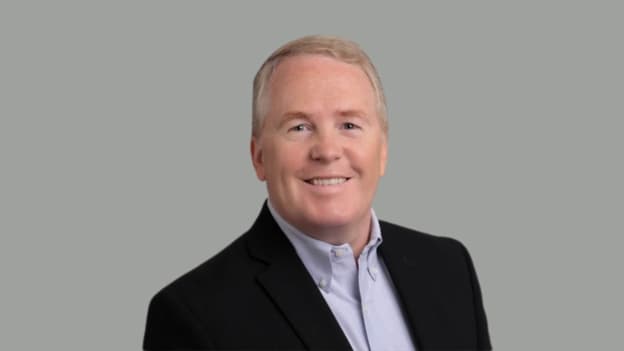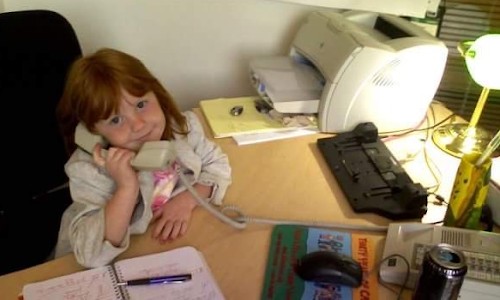Working parents must make peace with the fact that they won’t be able to do it all. And Reputation’s CPO Michael S. Erisman says it's okay

For a working parent, the demands are never ending. There is so much to do and try as you might, one is never able to check everything off the to-do list. While you may want to give your best at your job as well as enjoy the little and big moments in your kids’ lives, it always seems like an impossible feat, more so now in the hybrid model. But fret not! Single parent Michael S. Erisman, who is a strategic HR and talent acquisition expert shares advice for working moms and dads on setting clear boundaries for healthy work-life balance, creating a schedule to accommodate your priorities at work and home and understanding that it is all about quality over quantity.
To set an example and inculcate a sense of what his work meant to him, Erisman would take his kids to his office from a young age and make a day out of it. In his 25 years of experience in HR functions at companies such as DocuSign, Microsoft and Parallels, he has realised that work is only a part of one’s life and finding the right work-life balance can be a gamechanger for a working parent.
In an exclusive interaction with People Matters, Erisman, who is currently the chief people officer at Reputation talks about the platform and how it is changing the way companies gather and act on customer feedback to drive decision making and enhance Customer Experience (CX) programs, the need for every organisation to adopt a flexible work model, the lessons he learnt as a single parent and what has worked for him so far when it came to work-life balance. Excerpts from the interview:
As the chief people officer at Reputation, what are some of the innovative HR strategies in place to improve employee engagement and curb the attrition rate as we move towards a hybrid work model?
Flexibility is at the forefront of our employee engagement strategy. With team members spanned across different cities, states and countries, it is the only way to have meaningful innovation in this hybrid world.
Our flexible work model allows employees to work remotely, in-person in one of our modern, open offices, or a mix of both. We think that this, paired with opportunities for meaningful, in-person collaboration, will be the way of the future.
Reputation’s benefits also reflect this move towards flexibility, where we offer a wide range of health insurance options, along with access to a variety of wellness tools including an employee assistance program and subscriptions to several platforms like Ginger, Calm, Aaptiv, Omada, and Carrot Fertility. Investing in opportunities for employees to take care of their physical and mental health needs sets the organisation up for success in the long run. Additionally, we also offer flexible time off and quarterly recharge days, where the entire organisation disconnects on the same day.
As leaders, in this new hybrid world, we need to make employees feel connected to a bigger vision. To achieve this, our firm offers a variety of employee-led resource groups that allow for meaningful connections among employees that are in similar life stages. For instance, our working parents' employee resource group allows parents across the organisation to support each other, celebrate successes, as well as share tips and best practices.
While these are great practices to follow, it is important for managers themselves to ensure their teams have clear goals, get ongoing real-time feedback and recognition, and have a work environment that values the employee, their unique background and diverse life experience and allows them to truly do their best work. All the great benefits in the world can’t overcome a lack of these basic expectations, so organisations have to be great at it and ensure every leader can enable these three key factors for everyone on their teams.
With the lines blurred between professional and personal life during the remote working model in the pandemic, how did you manage to create an atmosphere where you could switch off from work and focus on your home life after office hours?
For a long time, I have led global teams and always had to juggle schedules and time zones around the world, so this was nothing new for me. Working full-time from home eliminated some of the external boundaries, such as commuting, that used to divide work versus home. For me, the key has always been to turn it on and off, so as a leader, that was something I was comfortable doing. But with the shift during the pandemic, I realised that this was new for others and hence, I have been far more intentional with how I help create these work-life boundaries with my team, which requires me to be extremely purposeful and clear about setting expectations for others.
For instance, there are no expectations, implied or direct, about when employees at Reputation respond to emails. Leading by example, I make sure that I set aside time to disconnect from work regularly in order to spend time with my family and practise self-care. And just having these boundaries is not enough as I need to be visible and transparent about them to let my team know that this is perfectly okay to do.
I believe that those serving as leaders are in a unique position to set the tone for their department/organisation across all industries. It is our responsibility to set healthy work-life balance examples for our employees, so they in turn feel comfortable setting their own boundaries to combat burnout.
Also, it goes far beyond just setting boundaries about ‘after work’ hours or weekends, as one should try not to expect immediate responses and allow flexibility within the workday. For working parents, mornings and afternoons often involve childcare and school transitions, so employers should allow for that flexibility, depending on everyone’s schedule and the demands of the business.
To the extent possible, build clarity in expectations up front, avoid last minute fire drills, and allow employees to plan their lives around the deliverables they are accountable for. We can’t anticipate every instance, but clear goals and expectations can greatly increase the agency people have about how they deliver their work within the structure of their lives.
As a single parent, juggling work commitments while being there for your kid at every step of the way is not easy. What are some of the challenges that you have encountered?
I led a global HR function as a single parent, so managing work across multiple time zones and frequent travel, while working around my daughter’s schedule was a challenge. Since then, I have learned the importance of setting honest expectations with those around me, professionally and personally. Working later in the evening after the kids were asleep worked well for me. I also learned from my mentors and leaders that it's about quality over just quantity. Most importantly, I understood that being fully present, whether that is with children, or colleagues, even if for a brief period of time is far more effective than being frequently distracted or always multitasking.
You have often spoken about finding meaning and purpose at home so work adds to your life and not becomes your entire life. On days when you have had a hectic work schedule and your child also demands all your attention at home, how do you find your ‘me’ time and a few minutes of solitude to recharge?
I am not going to sugarcoat it - finding time to recharge when managing work and family responsibilities can be hard. However, find some free time during the day, whether it’s in the mornings before your kids are up, during the lunch hour or at night when they’re asleep, to do what you need to do to block that time off for you. Setting boundaries and clear communication can help in this endeavour. It might be intimidating at first, but it will be worth it in the long run.
If you really stop and think about it, we rarely get burned out doing what we love, or at least what is meaningful. The other main approach I take is to recognise that I have to have priorities and that everything is not equally important. I have had to learn to battle perfectionist tendencies where I gave everything equal value, but the reality is that some things I have to do really well, some things just good enough and some things I have to let go of entirely. Understand that tomorrow is a new day, so do your best, learn from what went well or not so well, and don’t take on emotional burdens that are not real or yours to own.
Drawing from your own experience, can you share advice or tips for all the parents out there on ways to create a work-life balance and how to prioritise professional and personal goals, depending on circumstances and situations at hand?
As I said earlier, finding work-life balance as a parent is challenging, but it can be done. And here’s how:
Prioritise: I would encourage all parents to make peace with the fact that you will not be able to do it all at the same time, and that’s why it is balance.
Setting boundaries at work: I would suggest employees to have open and frank discussions with your team and manager about expectations, boundaries, and work styles, and if you don’t feel supported in your current workplace, seek out a new one that will provide flexibility.
Communication is the key: Talk to your kids about what you do for a living, and talk to your colleagues about your kids. When the former knows more about your career and your goals related to it, it will set an example for them as and when they begin their professional journey, and having the latter know about your family, even at the surface level, will make boundary and expectation setting more of a natural process.
In an effort to introduce his professional life to his daughter, Erisman took Sophie, 5, to his office late in 2009.
The workforce and the workplace need to become more supportive of working parents and caregivers. A flexible work model is a start; we can do much more in this space so everyone in the workforce can embrace work-life balance. Companies that understand this will have an advantage. While not all jobs can be flexible, due to in-person requirements and other demands, those roles that can be done flexibly need to be allowed to do so.
With flexibility becoming a key aspect in today’s work culture, how are managers and leaders trying to accommodate the ever-evolving schedules of employees, while building a successful organisation?
The most successful HR leaders and people managers are balancing flexibility and organisational growth by hiring the best people for the job and trusting them to do it well. Leaders that hold on to micromanaging practices will do their employees and their businesses a disservice because it will slow employees down, foster a culture of fear and lead to burnout and turnover - none of which help a business flourish. We are seeing a well-needed shift from managing for activity to managing for outcomes, and there is a huge difference between the two.
Managers will require more purposeful engagement, as a remote workforce can often miss out on the cultures created in in-person workplaces. Creating a sense of relationship and belonging can easily be achieved across remote employees, but it requires a different mindset and the approach of managing the outcomes, not activity. It requires intentionality, and vulnerability and it starts with us as leaders first. I understand that this can be challenging, however, the sooner we embrace it, the faster we can develop best practices for fostering a best-in-class people experience.
















